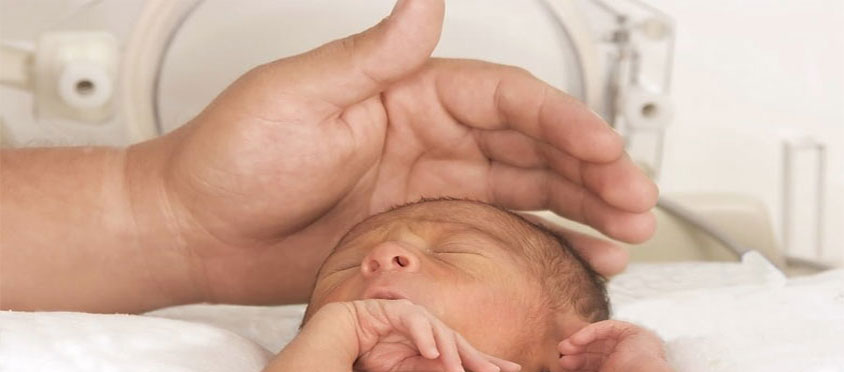Intrauterine growth retardation or IUGR is caused due to inadequate blood supply to the foetus. Read on to learn more about the causes of this condition and how this kind of complication is diagnosed and treated.Intrauterine Growth Restriction or IUGR is known to be the result of different causes. Placenta carries oxygen and nutrients to the baby and also assists is release of waste products of the baby. Complications like IUGR are caused when there lays some problems with the placenta. Let us take a look at what is intrauterine growth retardation.
What is Intrauterine Growth Retardation?
Intrauterine growth retardation (IUGR) is a condition where the growth of the foetus is abnormal, a result of reduced blood flow through the placenta (which is the source of the baby's nutrition). IUGR is often accompanied by
decreased amniotic fluid around the baby.
What are the causes of IUGR?
It could be caused by poor nutrition or excessive
smoking, drinking or illicit drugs use. It could also be caused by medical problems in the mother, like high blood pressure or an obstetric complication. It is rarely caused by a chromosomal disorder (birth defect). IUGR is known to occur in 3%-5% of pregnancies.
How is it IUGR detected?
IUGR is suspected when the size of the baby is smaller than what it is supposed to be based on the gestation age. It could first be detected during a routine external examination of the abdomen, but it should then be confirmed with a sonogram, because a sonogram is the best procedure for determining the size of the foetus.
How does IUGR affect the pregnancy and the baby?
If intrauterine growth retardation is confirmed, and tests indicate that the risk to the baby from continuing the pregnancy is higher than that of
premature birth, then doctors may recommend delivering the baby before the due date. Note that if this condition was caused due to poor nutrition, it can be treated with proper nutrition and rest.
What are the symptoms of Intrauterine Growth Retardation?
The symptoms are not very acute for a gestational age baby. This is particularly when weight of the baby is below 10 percentile.
Depending on factors resulting in IUGR, your baby may look malnourished or small. She may appear pale, thin, have dry and lose skin. The umbilical cord also appears dull instead of shiny and thick.
However, you need to keep in mind that all babies born small do not suffer from Intrauterine Growth Restriction.
What are the methods of diagnosing Intrauterine Growth Retardation?
Doctors use different methods to note size of the growing baby. The simplest and the most common method are measuring distance of the mother's fundus to pubic bone. Measurement in centimetres after the
20th pregnancy week corresponds with the total number of pregnancy weeks. A figure on the lower side shall indicate the baby is not growing to the size it should be.
Other measures used to determine health of the growing baby are as follows:
Ultrasound Scans
Ultrasound scans are performed to measure the baby in the uterus. The sound waves that the scan sends help creating pictures of the baby. Your doctor shall move an instrument on your belly to check your baby in course of the
ultrasound scan.
These scans are considered useful to measure abdomen and head of the baby. Your baby's measurements shall be compared with the growth charts to get the estimated weight at a particular stage. These scans are also designed to measure amniotic fluid content in your uterus. If you have low amniotic fluid content that too shall be indicated in the tests.
Doppler Flow
This is another technique that sends sound waves to measure speed of blood flow into the vessels. This test is performed to check blow flow through the umbilical cord and the vessels.
Weight Check Ups
Your doctor shall check your weight on a routine basis. This shall also help determine rate of growth of your baby. If you are not gaining weight satisfactorily, it might signify a problem for your little one as well.
Monitoring the Foetus
Doctors place sensitive electrodes during the tests on your abdomen. The electrodes are attached with a monitor where you can see the heartbeat of your little one.
What are the treatments for Intrauterine Growth Retardation?
Factors like severity of the problem are taken into account before proceeding with the treatment method. The earlier it is detected the better it is. Early interventions ensure the problem is not very severe and there is less risk to the little child. Doctors suggest careful monitoring with ultrasound and Doppler. Even though it is not possible to reverse effects of IUGR, there are some steps you can take to minimize the effects. Take a look below:
- You need to ensure a very healthy diet and proper nutrition. This can increase chances of weight gain and proper growth of your new one inside.
- Rest as much as possible. Bed rest is known to increase circulation to your child.
- Doctors sometimes suggest early delivery of the child who seems to be in danger. This decision is generally taken when doctors feel the baby cannot take the stress of labour and delivery. A C- section is generally suggested in such cases.
Therefore, in order to protect your baby from such complications, you should make sure that you follow a healthy lifestyle when you plan a pregnancy and throughout the pregnancy. It is also very important to monitor baby’s growth and development by visiting an obstetrician as per the schedule suggested by him or her. Eating healthy, taking proper rest is also a must.
What is intrauterine growth retardation? How to prevent intrauterine growth retardation? What are the ways to treat intrauterine growth retardation? Discuss here. 






























